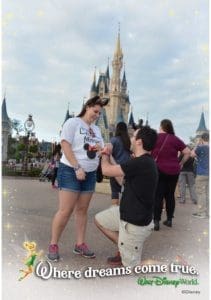My proposal was from my childhood dreams! My fiancé proposed in front of Cinderella’s Castle at Walt Disney Worlds Magic Kingdom. It was a moment I will remember and cherish for the rest of my life. However, the journey to my engagement and dream marriage proposal was far from a fairy tale.
 Before joining the Dr. Scott Sibley’s research team, I was hesitant to allow myself to commit to an engagement. I was confident in my love for my significant other, my commitment towards him, and my desire for an engagement. However, I felt as if I was too young to get engaged since I am only 22 years old. While comparing myself to my peers I felt naïve and foolish for wanting to be engaged at 22. I was encouraged to focus on my studies and develop a professional career before I should even begin to think about engagement. Yet, despite the criticism, I still felt the yearning to solidify my commitment and love to my partner with an engagement to marry.
Before joining the Dr. Scott Sibley’s research team, I was hesitant to allow myself to commit to an engagement. I was confident in my love for my significant other, my commitment towards him, and my desire for an engagement. However, I felt as if I was too young to get engaged since I am only 22 years old. While comparing myself to my peers I felt naïve and foolish for wanting to be engaged at 22. I was encouraged to focus on my studies and develop a professional career before I should even begin to think about engagement. Yet, despite the criticism, I still felt the yearning to solidify my commitment and love to my partner with an engagement to marry.
During this internal battle in my life, I joined Dr. Sibley’s Research Team. I was ecstatic to dive into the research regarding relationship commitment, although I was especially excited about this experience to help me better understand and solve my engagement dilemma. Although I did not doubt my desire to eventually marry my then boyfriend, I feared public disapproval about the engagement due to my age. It was during the first few research team meetings that I became familiar with Scott Stanley’s concept of sliding versus deciding, which is the idea that you should make conscious and intentional decisions in relationships (especially during transitions) instead of “sliding” into decisions. I felt as if this summed me up perfectly! I wasn’t making a clear commitment in my relationship and was letting myself slide into not making a decision. This small motto caused me to change the way I viewed my decision-making process and gave me the courage to decide to pursue an engagement with my significant other. To quote Scott Stanley’s from his recent blog post “That Decision Wasn’t Made There”: A Super Bowl Insight on Commitment:
“Clear decisions anchor commitments, and the timing of those clear decisions often matters. In contrast, sliding through key moments is letting stuff happen to you, and it can result in losing options before making a choice.”
This quote resonates with my struggle and my decision to pursue an engagement with my significant other. I made a decision to commit myself to spending my life with my significant other. While the timing may seem too early for others it was perfect for me. We got engaged over the winter break of my senior year in college. I feared this transitional period of my life and wished to enter it with a clear and public commitment to my significant other. Although this was a stressful period of my life I was thankful for the opportunity to critically analyze my decision to get engaged.
As stated above, my fear of getting engaged largely stemmed from the negative light society has placed on young engagements recently. More often now individuals are pushing back marriage and having children in order to invest in themselves. The idea is that emerging adults should remain focused on doing well in school, building careers, and becoming financially stable before seeking a significant other. Young Americans are postponing marriage, and according to the U.S. Census Bureau, in 2017, the median age at first marriage 27.4 years for women and 29.5 years for men which is the highest point on record. However, an article written by Susan Pinker brings a different perspective to the trend of delaying marriage. In her article entitled “For Long-Term Happiness, the Wedded Win the Race” Pinker introduces the results of a multiyear survey which sought to answer the question of whether or not marriage makes people happy. The survey results found that “married people were 10% more satisfied than people who were single” and stressed the importance of seeing your significant other as a friend, stating that “close marital bond spurs long-term happiness.”
While the trend as of late is to pursue happiness through self-accomplishments such as education and career advancement, I believe this generation is missing out on the excitement of being able to grow alongside someone you love, respect, and are committed to. While seeking education through trades, apprenticeships, or college is an important aspect of emerging adults lives and it is not a period of life that needs to be spent alone. With many more emerging adults choosing to delay marriage while focusing on education and career advancement we have seen the growth of hookup culture in emerging adults through social media and apps like Tinder, in addition to encouraging emerging adults to ghosting each other as meaningful relationships and commitment is not emphasized to emerging adults while obtaining an education. While I believe that it is important for emerging adults to focus on their education the culture surrounding the trend of delaying marriage can become harmful to emerging adults as they navigate relationships, rejection, and heartbreaks.
Although the grand majority of emerging adults still want to get married (e.g. Willoughby & James, 2017), they are marrying later and later. As I reflect upon my recent engagement I look at my past fears and feel silly that I was nervous about the reactions of my family and friends. After announcing my engagement, I was relieved to receive a plethora of congratulations! If you are considering taking the step of engagement with your significant other I implore you to not consider the reaction of your family and friends, but your personal desires to commit yourself to your significant other. If you have found the right partner and you are both committed to the long-term future of your relationship why wait?
References
- Geiger, A., & Livingston, G. (2018, February 13). 8 facts about love and marriage in America. Pew Research Center. Retrieved from http://www.pewresearch.org/fact-tank/2018/02/13/8-facts-about-love-and-marriage/
- Lupo, T. (2018, January 30). Now You See Me, Now You Don’t: Ghosting in Romantic Relationships. Decide To Commit. Retrieved from https://decidetocommit.com/now-see-now-dont-ghosting-romantic-relationships/
- Pinker, S. (2018, January 26). For Long-Term Happiness, the Wedded Win the Race. Institute for Family Studies. Retrieved from https://www.wsj.com/articles/for-long-term-happiness-the-wedded-win-the-race-1516981260
- Stanley, S. (2018, February 9). “That Decision Wasn’t Made There”: A Super Bowl Insight on Commitment. Institute for Family Studies. Retrieved from https://ifstudies.org/blog/that-decision-wasnt-made-there-a-super-bowl-insight-on-commitment
- TwentySomethingMarriage.org
- Willoughby, B. J., & James, S. L. (2017). The marriage paradox: Why emerging adults love marriage yet push it aside. New York, NY: Oxford University Press.











